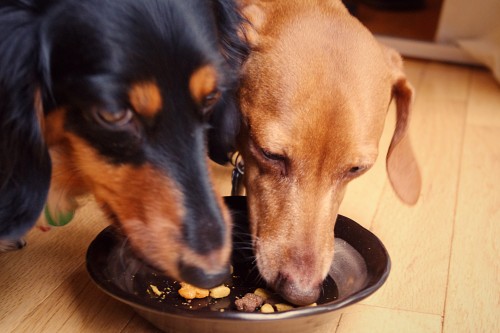Feeding Your Dog Cottage Cheese
Whether you are tempted to feed your dog with your occasional table food or generally just supplementing his diet, it’s always best to first try those foods in small quantities, keeping in mind that every dog is different from the others.
Sometimes those doggie eyes get the best of us and we find ourselves slipping them a treat from our own plates, however, just because some food is great for us doesn’t mean that it’s automatically safe for dogs.
Is Cottage cheese really good for dogs?
Cottage cheese has always been a healthy food for human beings due to its high concentration of proteins and a low fat content. Dog owners may find themselves wondering is cottage cheese good for dogs?
The immediate answer is yes, but in small moderate quantities. Dogs are simple, lactose-intolerant animals and consequently find themselves unable to digest a number of dairy products. Generally, fermented dairy products like cottage cheese do contain very high contents of lactose. Most dogs and cats will have no difficulties with digesting cottage cheese.
What cottage cheese provides
Cottage cheese is high in protein and is also a very good source of essential vitamins, calcium and phosphorus. It also contains vitamin A, B-complex vitamins and the essential fatty acids. Cottage cheese can be a very good source of protein for a dog that experiences occasional diarrhea. It can also provide protein for a dog when it is recovering from an illness or injury. An average dog will enjoy one or two spoonfuls of cottage cheese in a day.
Cottage cheese intake
Small, controlled amounts of cottage cheese can come to be an elementary part of a doggies diet. It may add a little flavor to your pet’s bland dry food. Blending a little bit of cottage cheese into your dog’s diet may go a long way; however, over consumption of it may lead to digestive upsets in dogs.
Always be sure that the cottage cheese amount does not exceed 10 percent of his daily dietary intake. It’s therefore very important to remember to do it in moderation.
Many veterinarians even prefer that you feed dogs suffering from digestive upset with a bland diet that is composed of cottage cheese and rice.
Deciding When Is Too Much
Since all dogs are different, it may be difficult to determine your dog’s dairy product tolerance level. Knowing this may become a trial and error process, ending up in giving your dog too much cheese.
Since dogs are often lactose intolerant, it may result into diarrhea, bloating, flatulence and many other digestive upsets. Some dogs may eventually experience constipation.
Nevertheless, not all dogs are lactose intolerant. This means that you have to test your dog’s dairy product level. If you find him experiencing no illness from consumption of cottage cheese, you may proceed with small portions. However, if your dog becomes ill after consuming cottage cheese, you can decide on whether to take it off his treat list. Otherwise, try offering him a cheese that is free from lactose to observe how his body will handle it.
It is always advised to consult a vet before embarking on foods that are outside the norm. Always keep your dogs health as a top priority.
Dog Weight Loss
See how a dog lost 77 pounds of weight with an appropriate diet. Note that if your dog is overweight, it likely what you're feeding him rather than genetics. A proper diet can go a long way to ensuring a healthy and happy life for your canine. Think about revise your dogs diet if weight gain seems to be a problem.
Dog Diet Basics

Dogs essentially need four elements of food in order to survive and be healthy. When dog do not receive the below sufficient elements, he or she can become sick and/or overweight.
1. Water is essential for all living things and is the most important key to survival. Dehydration occurs in dogs when they lack sufficient water. The general rule of thumb is a minimum of one ounce of water per pound of dog, per day. However, a dogs activity level, environment, or other factors may require much more. Keep fresh water available at all times.
2. Protein from animals is not necessary for a dogs survival, but it greatly increases their chances for a healthy life. However, a dog should have an appropriate mix of meats and foods from plants like grains. Look for dog food that has both animal protein and plant-based foods.
3. A bit of fat is good for your canine and it helps produce energy. It also assists in the functions of cells, muscles, nerves, and tissues. According to petmd.com "Common sources of omega-3 fatty acids are fish oils (herring, salmon, etc.) and flaxseed and canola oils. Commonly used omega-6 fatty acid sources include pork fat, chicken fat (or any poultry fat), safflower and sunflower oils, as well as corn and soybean oils (vegetable oils). Watch out for lower-quality ingredients such as tallow or lard."
4. The types of vitamins your dog need will depend on the quantity supplied through his or her natural diet. Sometimes vitamin supplementation may be vital to your dogs health. Consult with your veterinarian to determine if supplementation is right for your dog.
